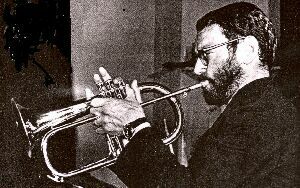










          |
| Ian Carr - 2... |
 |
|
Ian Carr was a pioneer of European bebop in the 1950s with his brother's band, the EmCee Five, the co-leader with Don Rendell of one of the most lyrical but adventurous modern jazz groups of the 1960s and an early convert to jazz-rock fusion with his band Nucleus. He was also an accomplished author, broadcaster and teacher. His biography of Miles Davis was acclaimed as 'the definitive biography', and his book on the 1960s avant-garde, Music Outside, is an excellent survey of the originality and breadth to be found in British jazz. He was the co-author with Brian Priestley and Digby Fairweather of the Rough Guide to Jazz, which, despite modest editorial resources, rivalled the much larger New Grove Dictionary of Jazz for depth and accuracy. His Channel 4 TV films, made as interviewer and presenter for the director Mike Dibb, on Davis and on Keith Jarrett, were the high points in a long broadcasting career that included several documentary series for BBC Radio 3. The students whom he inspired to play jazz, first at a North London weekend workshop, and later at the Guildhall School of Music and Drama, have included Julian Joseph, Jason Rebello, the Mondesir bothers and Nikki Yeoh. The EmCee Five, led by Carr's brother produced some of the most original British jazz from the period, and was recorded by the entrepreneur Denis Preston for Parlophone. Preston became a fan of Carr's lively playing on such pieces as Stevenson's Rocket, and this stood him in good stead when, soon after coming to London to turn professional as a musician and play with the flautist Harold McNair, Carr joined forces with Don Rendell to form a new quintet. From 1964-69 Preston recorded five albums by the Rendell-Carr Quintet, which stand as landmarks of creativity in British jazz Although they nodded in the direction of Miles Davis's contemporaneous groups, the quintet's investigation of literary source material, Eastern scales, unusual time signatures and extended forms set in motion a number of ideas that were not being explored anywhere else at the time. Central to the band's sound was the lyrical, passionate playing of Carr, who also wrote much of the band's material. The quintet also co-operated on discs with the African percussionist Kofi Ghanaba and with the Indian guitarist Amancio D'Silva. In 1969 the quintet split up and, despite forays into free jazz with John Stevens and Keith Tippett, Carr decided to opt for leading a jazz-rock band. The result was Nucleus which won the 1970 Montreux Festival Jazz Competition, and as a result went on to appear at the Newport Festival in the US. Carr was to lead Nucleus on and off for the rest of his life, recording numerous albums and also expanding the band for the ambitious extended works Solar Plexus, Labyrinth and (written by Neil Ardley) Kaleidoscope of Rainbows. At the heart of the group's work was the idea of paring down musical form to its simplest, allowing the musicians huge improvisational scope over repeated rock basslines and rhythms. |
 Carr wrote: "It requires incredible imagination to think up a really good original and vital riff which is only really a melodic and rhythmic fragment. To get a good one is very hard without it sounding trite, corny or too pretentious." From 1977 Carr also became a member of the German-based United Jazz and Rock Ensemble, playing alongside his fellow trumpeter Kenny Wheeler and the British musicians Barbara Thompson and Jon Hiseman. The band was led by the pianist Wolfgang Dauner, initially to play on television, but soon for live concerts and tours. Its first album, Live in Sch'tzenhaus, sold 60,000 copies in its first year and went on to become Germany's bestselling jazz record of all time. The band was to have a life of more than 20 years, releasing its final album, X, in 1999. Carr's writing career began in earnest in 1973 with the publication of Music Outside, and its combination of interview and criticism became the method he employed for his subsequent biography of Davis (1982). A revised edition came out in 1999, after Davis's death, which allowed Carr to look back more reflectively at the trumpeter's life, and this was hailed by The Times as 'the standard work'. In 1983 Carr was given a diagnosis of colon cancer, but after several operations he was clear of the disease and able to resume playing and writing, undertaking a particularly arduous tour of South America with Nucleus for the British Council in 1984. His biography of Keith Jarrett came out in 1991. By this time he had presented several BBC series, including documentaries on Davis, Jarrett and the Boston-based composer and theorist George Russell (in whose Living Time Orchestra Carr had played on a European tour). Carr had also begun teaching at the Guildhall School and was a regular contributor to jazz workshops and residential courses. He was a regular CD reviewer for BBC Music Magazine, and saw through two updated editions of the Rough Guide to Jazz. Carr won the 2006 BBC Jazz Award for services to jazz, but by the time he appeared at the ceremony he was already suffering from dementia. He died on February 25, 2009, aged 75. Ian Carr discography... |